Get posts by email
Project-Based Learning & Interview Assessments
March 12, 2015
This post is a summary of Celine's first year of high school, or scholar studies. Which was a season of project based learning.
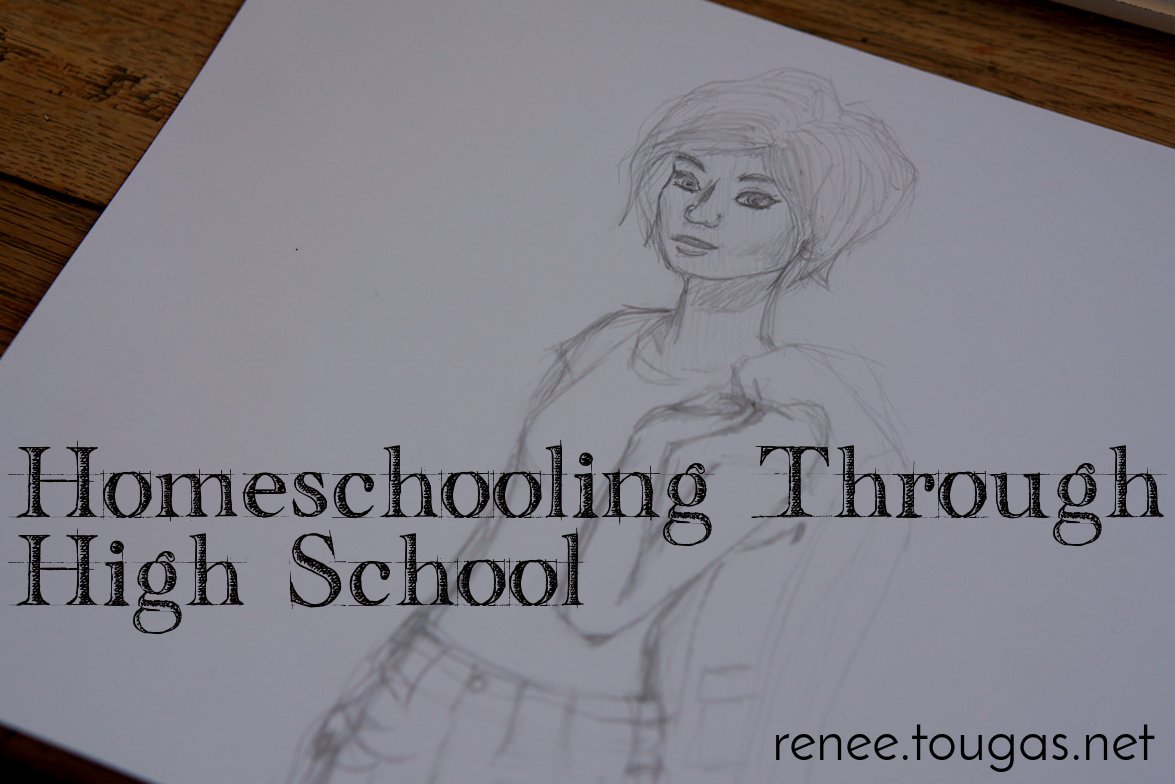
Before we start, a brief note about grades, ages, phases...
We don't do school grades but Céline, currently aged 15 (16 in May) is "Grade 10 age" or "Secondary 4 age" in Québec. She started her high school years, which we also call the scholar phase, at thirteen and a half.
By comparison, Laurent, currently just fourteen, has not yet started his scholar or high school years. He is in the transition period, a learning phase marked by a certain restlessness and periods of dissatisfaction (whining) with some of my leading but not yet willing, ready or able to take significant self-initiative in directing his own education. Also, we have more ground to cover in his written communication skills (due to his delayed reading because of dyslexia) before he can launch high school. His "grade level" is 8, secondary 2 in Québec.
Céline started her homeschool high school education two years ago, in January 2013.
Céline was dissatisfied with her emergent high schooler curriculum I put together the previous fall and wanted to almost exclusively study Role Playing Games, since that was the only thing motivating or interesting to her in that life season. (I will admit, this caused a bit of panic in me initially.) So we switched gears that winter, handing the reins over to Céline, stepping back to be parental advisors and guides in what became a project-based learning season for Céline.
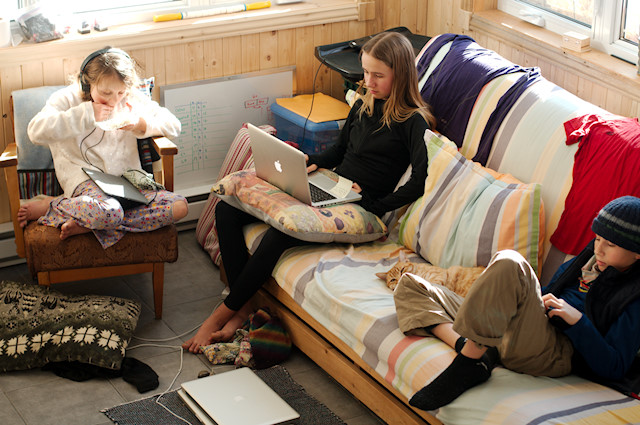
In Fall 2013, Céline's grade nine year (in compulsory school speak) she continued with her project, though to a lesser degree of commitment and interest than the previous winter and spring. And in the open spaces created by the waning interest in her project, I supplied options and resources for Céline to help guide and inspire her, and she often joined in activities I was doing with Brienne and Laurent. But she still mostly directed her days and her learning.
In truth, homeschooling was quite low-key that fall. It was a back-to-basics, barebones curriculum because that's when we started preparing for our hike and our video series. Talk about project-based learning! That was a large scale project the whole family was a part of.
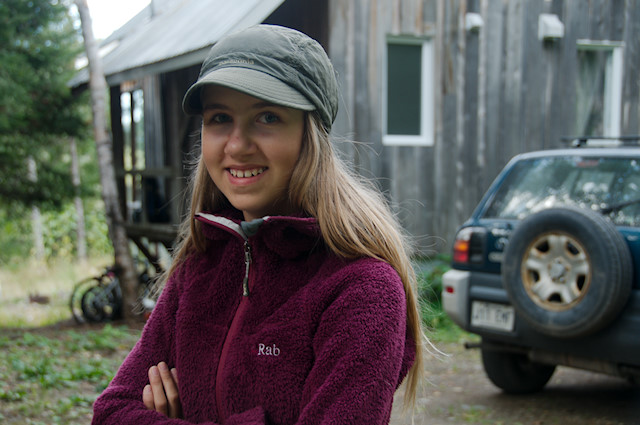
In the context of that family project and Céline's changing interests and growth, interest in her own project waned and it was shelved, indefinitely.
I want to address something here.
Quitting Projects
A lot of homeschool parents get hung up on kids completing things they start. I understand the reason for this.
The root of this is a fear that our kids will grow up to be irresponsible adults, and not be able to follow through on their commitments.
In our eagerness to see that they complete what they start (do you complete everything you start?) we might encourage small projects because we know they are doable. Don't dream too big, that kind of thing.
Or we crack the whip even when our kid's enthusiasm is totally gone and their interests lie somewhere else completely. Because by golly, we are going to have this thing completed so we can prove to ourselves, grandma, the neighbors, the school board, whoever, that homeschooling works, that our kids haven't failed and by extension, we haven't failed.
Hokey dinah people. That's a lot of small thinking, fear, pressure and joy-sucking living and learning.
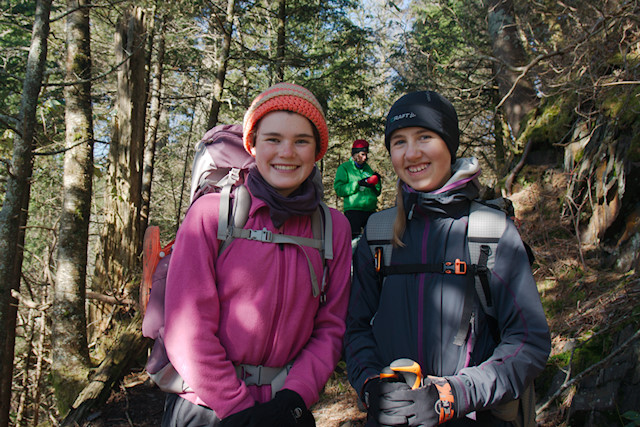
on the AT in the Great Smoky Mountains National Park, TN 04-23-14
two very cool homeschooled teens: Invisible Bear & Padawan
There is so much to be learned by doing a project.
I don't know all the psychology behind project completion. I know that we tend to complete things when money is on the line, and sometimes no matter how committed we are and how much we've invested of time or money, we can't see some ideas through to the end.
Sometimes we complete projects, sometimes we don't. This is true for adults and children. This is true for everyone I know.
I agree with Kenny Rogers on this one. You've got to know when to hold em', know when to fold 'em... That's life, and homeschooling is no different.
Learning how to finish is an important character trait, and requires self-discipline. Learning how to re-evaluate and adjust course, based on new inputs, is just as important.
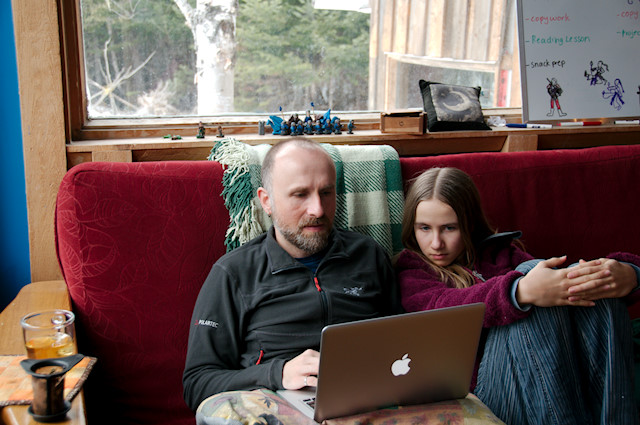
If you approach projects as a learning experience, learning how to manage and move through a project, not simply as a way to produce something that proves learning has happened (oh this is an easy trap for homeschoolers to fall into), you will gain so much from the experience, even if you don't complete it.
What we learned from Céline's project
The goal of Céline's project was to create a Role Playing Game (RPG). This was a big undertaking as RPG's are complex and multifaceted. They have a storyline, game mechanics, the world the game is "set in", etc.
(If your kids are interested in RPG's you might appreciate RPG Maker, Windows software to make your own games. We haven't used it, I can't make any recommendations.)
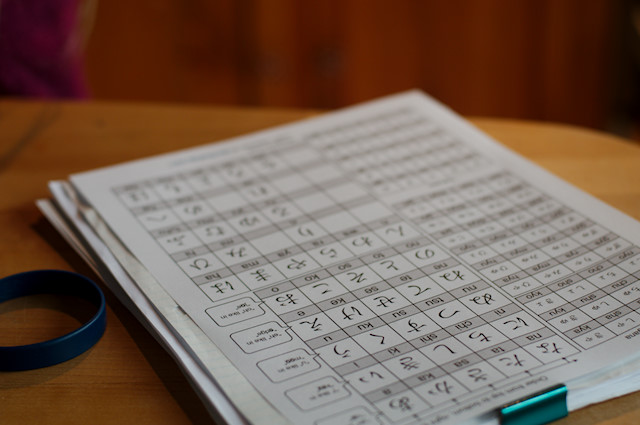
We learned three big things in the course of Céline's project.
- Knowledge, skills and aptitudes acquired in the process of creating the game.
- Team project management.
- Interview-style assessments.
1. Knowledge, Skills & Aptitudes
Céline's game was set in mythical feudal Japan, which necessitated research and study of Japanese history and culture. These cultural studies and research landed Céline in a self-paced beginners Japanese as a second language course.
In addition to her Japanese studies, Céline's developed research and correspondence skills, as well as technical skills in using software and other computer tools to produce the MMF's (see definition below) of her project, the map for example.
I could share more details here but they are specific and personal. Suffice to say, history, geography, Japanese as a Second Language, and computer applications were subjects studied in-depth.
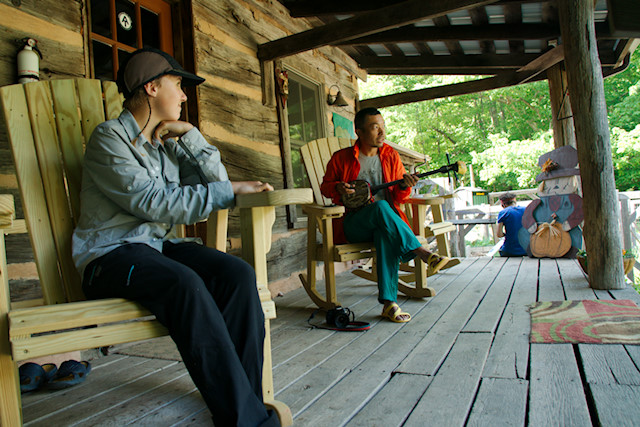
Meeting Japanese friends on the Appalachian Trail
Padawan & Taka at Woods Hole Hostel, Pearisburg, VA 05-31-14
2. Project Management
To facilitate the development of such a large project and help the three of us manage it together (since we were all stakeholders in the project), Damien introduced two engineering, real world management tools into our homeschool, adapting and simplifying them greatly to our needs. Those tools were Kanban and Scrum Meetings.
I am not going to explain these management systems and tools. Like I said in my first post, when you start writing about higher level homeschool experience the information can get specific and arcane.
My goal here is not to explain a tool you can google an explanation for, but to share a wee bit of how these project management tools have influenced our homeschool.
Here are the briefest of definitions to give you some context.
Kanban is a production method (ironically, the Kanban system was developed by the Japanese car company Toyota) for managing the creation of products with an emphasis on continual delivery while not overburdening the development team.
We employed a very simplified version of it so we could all know, (somewhat) at a glance, where Céline was at in her project and also to limit the WIP's (works in progress) of such a large project. Our goal was forward movement and completed MMF's (Minimum Marketable Features), not perfection.
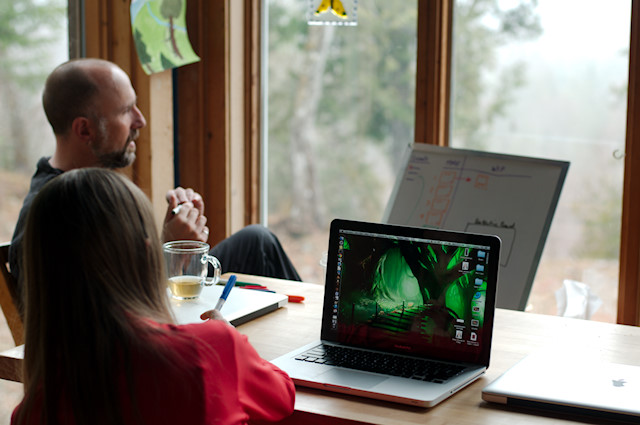
Céline did not finish her project through to the end, but because of Kanban's focus on MMF's she completed discrete parts of the project.
Scrum-style meetings was another tool we used to check-in with Céline in a regular basis to assess her project progress, and to understand how we, as facilitators and parents, could help her move forward.
Our meetings were modeled on the Daily Scrum, during which each team member answers the following questions:
- What did you do yesterday?
- What will you do today?
- Are there any impediments in your way?
By focusing on what each person accomplished yesterday and will accomplish today, the team gains an excellent understanding of what work has been done and what work remains. The daily scrum meeting is not a status update meeting in which a boss is collecting information about who is behind schedule. Rather, it is a meeting in which team members make commitments to each other. From Mountain Goat Software
We did not have daily scrum meetings. We had weekly, or bi-weekly meetings in which we answered the following questions:
- What have you done since the last meeting?
- What are you doing next?
- What are the roadblocks?
- How can we remove those/move past or through them?
The key purposes of these meetings was group accountability and problem resolution within the project, to identify roadblocks and help move Céline through them.
3. Interview assessments and collaborative facilitator/student meetings
Céline's project introduced "real world" project management tools into our vocabulary and home learning environment. And it taught me how to step back and be a collaborator, like a learning colleague, more than a supervisor/teacher.
Our regular meetings opened my eyes to alternative and effective forms of assessments and feedback between student and facilitator.
When Céline's education started to track away from the plans I had designed for her and into territory and interests I was unfamiliar with I had to figure out some way of checking-in with her, some way to assess what she was doing (which was mostly digital and therefore hard to observe) for record keeping purposes. Just what the heck was she doing exactly?
Céline is a technophile introvert. Her world is largely digital and intellectual. If I want to know what's going on, I need to ask.
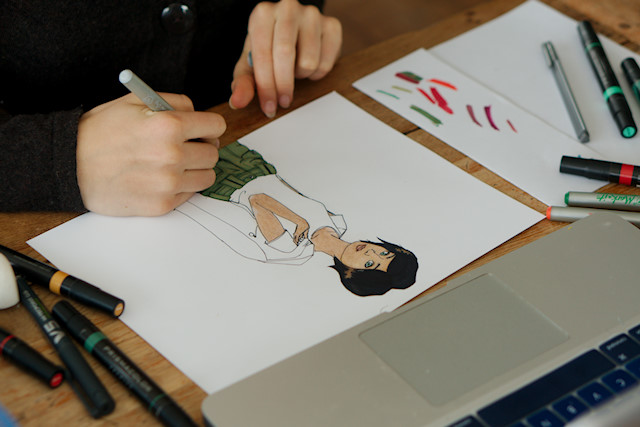
Our regular Scrum meetings together with Damien, which were centered around her RPG project specifically, showed me how I could apply those same questioning techniques to all of Céline's pursuits to understand where she's at, what stands in her way, and how I might help her move forward.
So I started interviewing Céline. Instead of recording my own observations about her progress, which is what I had been doing for her core and love of learning years, I started recording her observations, with notes of my own to add depth or context when needed.
Instead of trying to observe and answer, for myself, "what is she learning?" I ask the student directly "what are you learning?"
This is a subtle but significant shift.
Prior to this I would do monthly-ish assessments of my kids without them even aware that I was doing so. I have explained that record keeping system here.
When you don't use many packaged resources, online classes, textbooks or other standardized educational materials, when you allow your scholar students to design their own curriculum with materials and resources that may be well outside your personal knowledge base, keeping track of their learning can be tricky. You are not checking boxes in the "teacher's guide".
Regular interviews have been a great tool for me to check in with my kids, find out what they're up to (what they're learning), where they are stuck, and what they need from me.
I started doing this in Céline's first year of high school. And since coming home from our hike I have been using this tool with all three kids, even though the younger two aren't in their scholar phase yet.
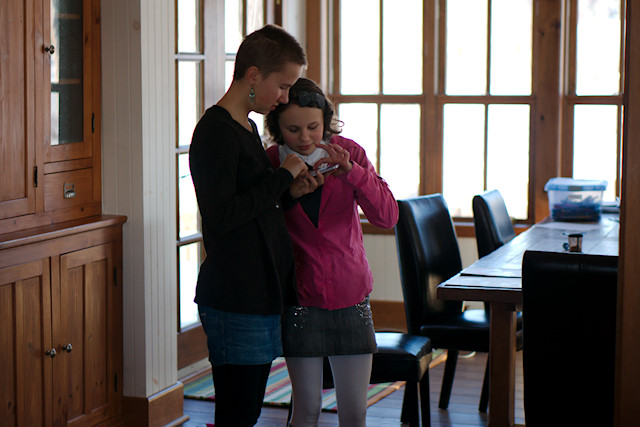
What does it look like?
Practically, this looks like a regularly-scheduled interview (once every six weeks or so) with each of my kids in which I assess three main things:
- Project progress, if they have a project on the go. They don't always have projects on the go.
- What are you learning? questions.
- What do you want to learn? questions.
Project progress is fairly straightforward, no one has attempted anything as in-depth as Céline's RPG project and so I manage these without Damien's help. He still assists with many projects, especially with technical aspects, but he's not in the management loop at this point.
I don't actually ask my kids What are you learning? Instead I ask them the following questions:
- What are you reading?
- What are you listening to?
- What are you making/creating?
- What are you watching?
- What are you writing?
- What are you studying?
From their answers I get a good picture, along with my own daily observations and interactions, of what they are learning.
Sometimes what they are reading, listening to, watching, writing, or studying (this is my catch-all category for anything that we may have missed in the other categories) is directed by me. Sometimes it's chosen by the learner. (I will get into the parent-directed aspects of our high school and late middle school curriculums in another post.)
What do you want to learn? is the forward motion part of the interview. These are the questions I ask to assess this.
- What are your current goals? And, or
- What do want to study or learn?
- What do you need to get there?
- What are the roadblocks?
These could be very simple things or quite complex. And sometimes the kids have nothing to say in answer to these. I'm going to address that also in another post.
The answers from this part of the interview give me my "homework assignment", to help resolve the roadblocks (or light sparks of inspiration) where needed.
Based on what my kids need and are asking for, I go to work on providing resources, or steering my learners in the direction of finding their own resources, to help them meet their goals.
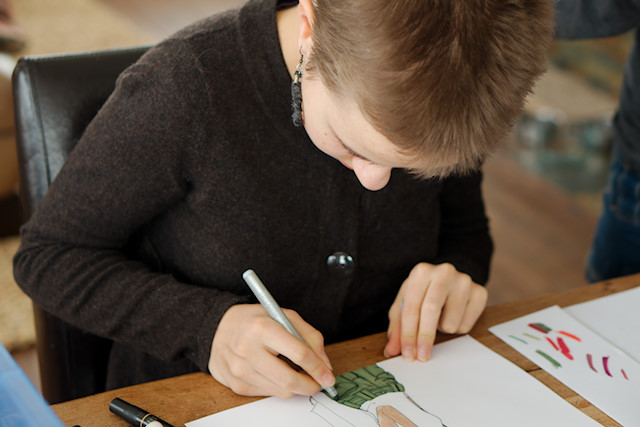
These are the formal interviews but there's informal stuff happening all the time. My kids don't wait 6 weeks to tell me they need help finding a time traveling book about fashion, for example.
In the time between our interviews I try to keep track (with little notes in Evernote) of the discussions we're having, books we're listening to together, interesting things we've watched, etc. but the regular interviews are my main assessment tool for the self-directed learning, project-based or otherwise, that my kids are doing.
Céline's first stage of high school (the beginning of her scholar years), roughly January 2013 through fall 2013, was transitional and transformational for our family and our home learning environment, with her RPG project dominating her curriculum.
In winter 2013/2014 we launched a large scale family project which took over our lives. Our Appalachian Trail family thru-hike - the preparation and hike itself - was the focus for the majority of Céline's second stage of high school.
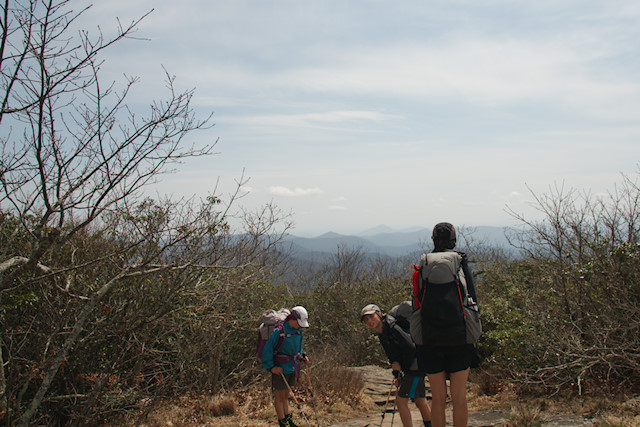
Blood Mountain, GA 04-03-14: only 2,160 miles left to go!
How many high schoolers can say they thru-hiked the entire Appalachian Trail in less than six months? (Approximately less than 20 individuals in the entire world.)
When we got home from the trail, the beginning of Celine's grade 10 year, the learning shifted again to a goal-driven curriculum. Which I explain in this post.
Written with permission and editorial input from Céline.
Filed Under
Resource Library
-

Charlotte on March 12, 2015, 5:17 p.m.
I have really enjoyed reading this article on the high school years in your family. I tend to be a schedule centered mom/homeschooler. Your method sounds a lot more fun and interesting. I may try incorporateing some of these ideas in a couple of our subjects next year. Thank you for this peek into your homeschool world.
-

Dana on March 12, 2015, 8:19 p.m.
Thank you so much for this post. I found it very insightful and inspiring as I try to put together my third and last child's trip through high school. I really enjoy all your posts and glean so much from them. Again, thank you and I look forward to your future homeschooling posts.
-

Krista on March 13, 2015, 1:56 a.m.
Very interesting. Takes a lot of courage to let go and trust that innate desire to learn. I find I tend to do a bit of wrestling with my kids as I learn to allow them to fully become who they want to be and follow their primary interests. For instance, Katia has quit French (she never liked it). She finally negotiated this with me by saying she needs the time to study sciences. She has broad interests and is enjoying an Industrial Arts class this semester, along with piano and art, and math 20 (her first time doing math in a school setting. She finds it so slow and boring because she can't go at her own pace as she always has in the past as a homeschooler. She looks forward to calculus for a challenge:)) On a different note, after concentrating so much on French we have now decided to visit Rome on our trip to Europe this summer so at least my youngest and I will be hoping Duolingo can teach us a few useful phrases pre-trip!
It is fun, too, how we become invested in eachothers' projects. On Monday when I received a call from my school saying I had recieved my diploma my youngest exclaimed, "we did it mom!" My son regularly texts us images of his current art work or video game designs for his college courses which we love. I guess I just love learning and am so incredibly delighted that each of my kids have thier own passions and a drive to pursue them.
-

renee on March 13, 2015, 11:48 a.m.
I agree. I just love learning too and love sharing learning with my kids :)
-
-

Lorina on March 13, 2015, 4:49 a.m.
Thank you. My homeschoolers are still younger than this but the insight and inspiration are invaluable to me. I'm saving this post for later. ;)
-

Heather A on March 14, 2015, 1:16 a.m.
I am thoroughally enjoying this series of posts! Thank you! I so loved your first post about Celine's RBG project two years ago, and now apprecate your clarity and insight with what both your daughter and yourself have learned from this lenghty project and all the many turns it has taken. My children are still in Core phase, but I can already see that the "what do you have to show for your efforts"/"sticking to your goals" trap is one that I'll have to watch out for. Already I have days when I struggle with not having any material evidence of my young children's learning (except muddy hands, a dirty kitchen, and endless lego edifaces). Thank you for taking the time to share your insights here. Your blog is always such an encouragemtn to me.
-

Lucy on March 20, 2015, 2:39 a.m.
Thank you Celine for allowing your Mum to share some of your learning with us. I have two younger kids but field so many questions from well meaning individuals "but what about high school? What will you do?" It's great to see how focused and tailored a homeschool education can be. Thanks again Renee for another easy to access piece.
You can subscribe to comments on this article using this form.
If you have already commented on this article, you do not need to do this, as you were automatically subscribed.






desilou on March 12, 2015, 4:27 p.m.
I adore this post. THANK YOU SO MUCH. I keep coming back to FIMBY because just when I think I don't have time to be online, you share something so encouraging and insightful. This post was a great encouragement to me this morning as a homeschooling mom of four littles, and the dose of reality check (hold 'em / fold 'em) was just what I needed this morning.